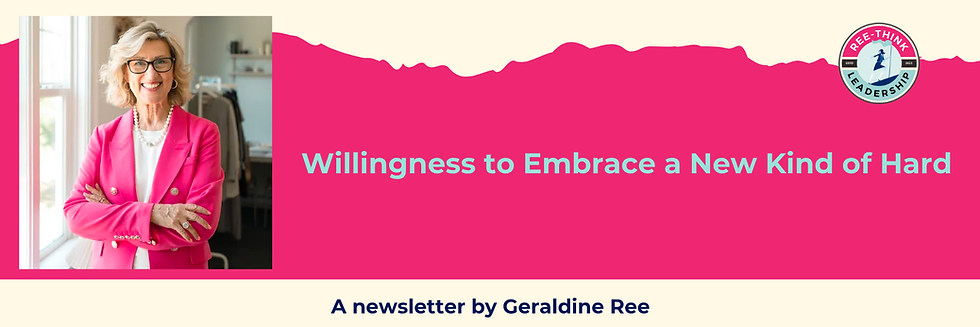The Hidden Cost of Comparison (and How to Stop Paying It)
- Geraldine REE
- Sep 24, 2025
- 3 min read

“Comparison is the thief of joy.”
-Theodore Roosevelt
We’ve all heard of, and likely experienced, the comparison monster. If I am totally honest, I’ve felt it creep into my room last night when I would rather have been sound asleep. “She really nailed that social post.” … “He makes it look so easy.” … “What is wrong with me?” These unhelpful thoughts come in waves when I am at a low ebb in my energy for doing the work I normally love.
Comparing ourselves to others is not only common—in the world of social media we live in, it is inevitable. Add in the pressure we feel to “perform,” and it can feel painful when we see others thriving while we are floundering.
The key is to acknowledge it as a beautiful and very human response to making sense of the world. We crave belonging and progress—two common steps on the ladder of self-actualization.
For entrepreneurs, comparison is essential because it helps you get a reality check on your current state. Knowing where you are compared to the benchmark of excellence in your category of peers helps you measure the gap. The gap is how far you have to go.
Comparison becomes a monster if we live in the gap rather than the gain. Dan Sullivan wisely urges entrepreneurs to start with the Gain:
“The way to measure your progress is backward against where you started,
not against your ideal. When you measure forward against your ideal,
you’re in the Gap. When you measure backward, you’re in the Gain.”
— Dan Sullivan
If you notice someone in your network doing imaginative work or achieving at a faster rate than you, keeping your emotions in check and figuring out how they are making it work is a helpful belief, rather than a harmful one.
As Jim Rohn famously says:
“Success leaves clues, and people who produce outstanding results do specific things to create those results. If you learn what they do and begin to apply the same strategies, you can produce similar results.”
When comparison shifts from helpful to harmful, it prevents you from doing your best work.
“I do not have enough” quickly becomes: “I am not enough.”
This “I am not enough” mindset doesn’t just hold you back from pursuing new goals. It often leads to even more damaging behavior, such as getting stuck in the weeds because of its quick-win gratification.
Doing lower-level tasks brings short-term comfort, but it stunts long-term growth.
To address the monster, you need a mindset shift. Reassure yourself that you already have what you need—and what you don’t have, you’ll acquire along the way!
You also need to let go of being in the weeds just because you’re the best “weed whacker” in your business.
As Shawn Friesen, multi-franchise owner with Expedia Cruises, says:
“Other people will find answers—maybe not as well as you at first—but even if they do it 80% as well as you, that’s pretty good! In the meantime, you free yourself to work on much bigger things in your business.”
Tie your worth to your progress, not perfection. You have come so far, and you will go even farther. Just keep running your own race and doing hard things to achieve what truly matters.
What have you recently let go of in your business to make room for growth?
I’d love to hear about your progress!




Comments